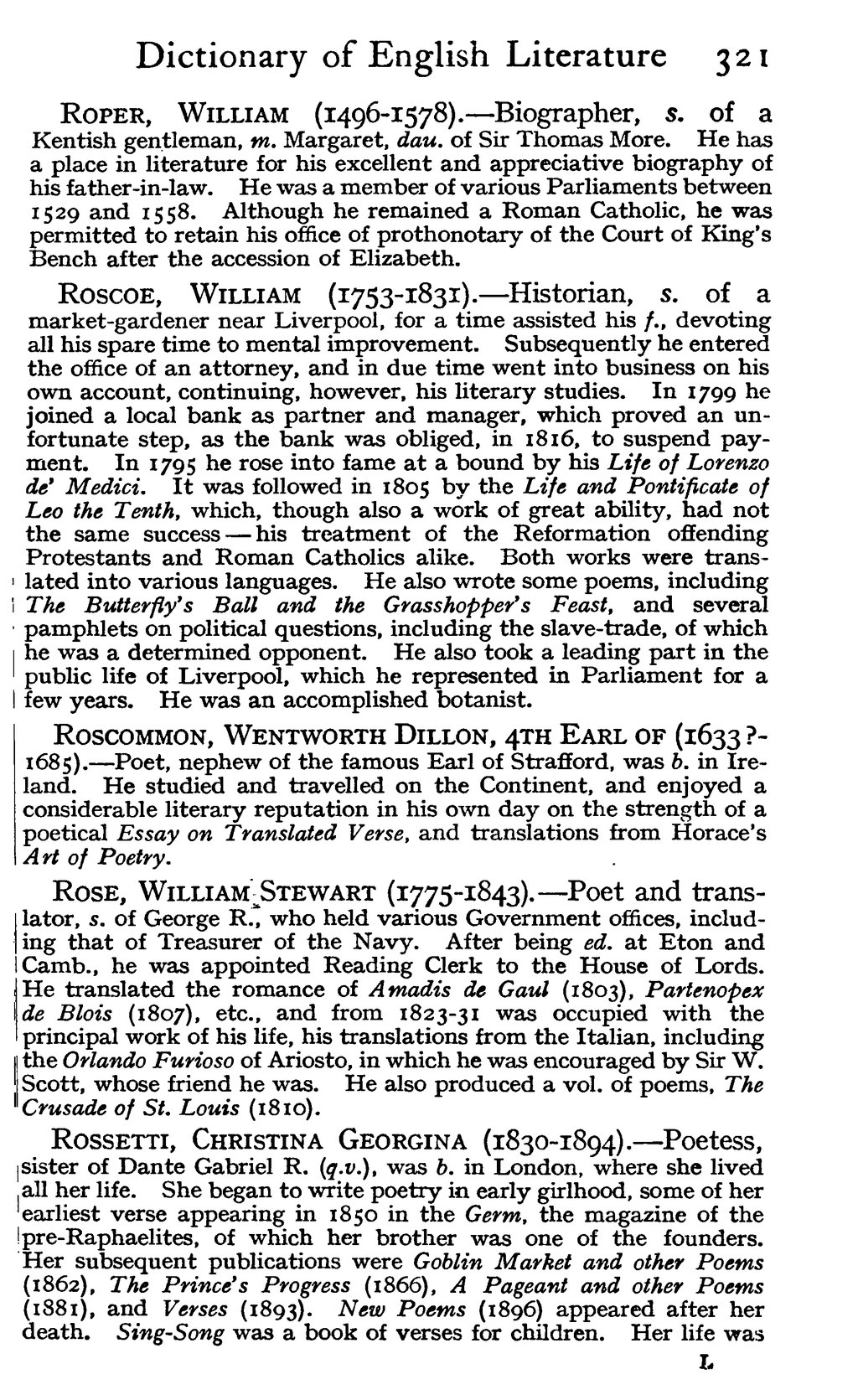Roper, William ROPER, WILLIAM (1496-1578).—Biographer, s. of a Kentish gentleman, m. Margaret, dau. of Sir Thomas More. He has a place in literature for his excellent and appreciative biography of his father-in-law. He was a member of various Parliaments between 1529 and 1558. Although he remained a Roman Catholic, he was permitted to retain his office of prothonotary of the Court of King's Bench after the accession of Elizabeth.
Roscoe, William (1753-1831).—Historian, s. of a market-gardener near Liverpool, for a time assisted his f., devoting all his spare time to mental improvement. Subsequently he entered the office of an attorney, and in due time went into business on his own account, continuing, however, his literary studies. In 1799 he joined a local bank as partner and manager, which proved an unfortunate step, as the bank was obliged, in 1816, to suspend payment. In 1795 he rose into fame at a bound by his Life of Lorenzo de' Medici. It was followed in 1805 by the Life and Pontificate of Leo the Tenth, which, though also a work of great ability, had not the same success—his treatment of the Reformation offending Protestants and Roman Catholics alike. Both works were translated into various languages. He also wrote some poems, including The Butterfly's Ball and the Grasshopper's Feast, and several pamphlets on political questions, including the slave-trade, of which he was a determined opponent. He also took a leading part in the public life of Liverpool, which he represented in Parliament for a few years. He was an accomplished botanist.
Roscommon, Wentworth Dillion, 4th Earl of (1633?-1685). —Poet, nephew of the famous Earl of Strafford, was b. in Ireland. He studied and travelled on the Continent, and enjoyed a considerable literary reputation in his own day on the strength of a poetical Essay on Translated Verse, and translations from Horace's Art of Poetry.
Rose, William Stewart (1775-1843).—Poet and translator, s. of George R., who held various Government offices, including that of Treasurer of the Navy. After being ed. at Eton and Camb., he was appointed Reading Clerk to the House of Lords. He translated the romance of Amadis de Gaul (1803), Partenopex de Blois (1807), etc., and from 1823-31 was occupied with the principal work of his life, his translations from the Italian, including the Orlando Furioso of Ariosto, in which he was encouraged by Sir W. Scott, whose friend he was. He also produced a vol. of poems, The Crusade of St. Louis (1810).
Rossetti, Christina Georgina (1830-1894).— Poetess, sister of Dante Gabriel R. (q.v.), was b. in London, where she lived all her life. She began to write poetry in early girlhood, some of her earliest verse appearing in 1850 in the Germ, the magazine of the pre-Raphaelites, of which her brother was one of the founders. Her subsequent publications were Goblin Market and other Poems (1862), The Prince's Progress (1866), A Pageant and other Poems (1881), and Verses (1893). New Poems (1896) appeared after her death. Sing-Song was a book of verses for children. Her life was
